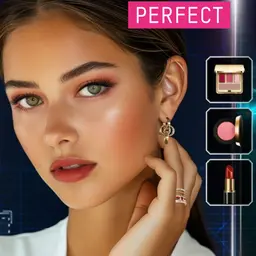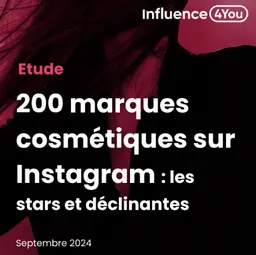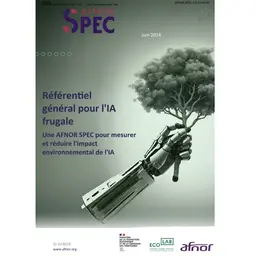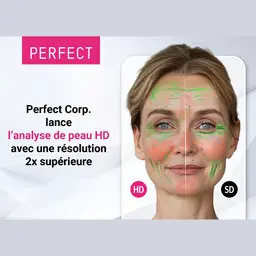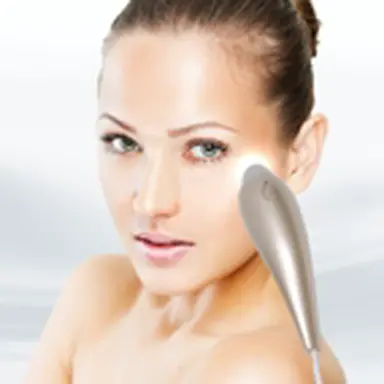
While canonical skin type classifications (dry/combination/oily) are increasingly deemed obsolete and Manichean by cosmetics professionals, ‘automated’ skin reading is on a roll, because it is more accurate. Farewell to the naked eye interpretation of the epidermis condition, hello to devices able to probe the skin in depth…
We already knew about the measuring instruments developed by major brands like Ioma, Skinceuticals, Galénic, or Vichy, to better analyze the skin condition. Now, it is the first time an organic brand has offered its own version of connected diagnosis. CosmeticOBS has tested Visioderme by Bioreline.
Project genesis
Daniel Constant, the brand’s Director, started his career in the development of medical and scientific instruments to help doctors confirm their diagnoses. Then, he decided to totally change professional pathways by turning towards cosmetics, an industry in which his wife was already well-established. By founding the Bioreline brand, Daniel Constant realized this ‘trade suffered from a deficiency: an obvious lack of equipment to test the skin, identify its unbalances, and verify the efficacy of the treatments offered.’ Thanks to his skills in this field, he got down to the creation of a probe able to test the skin in depth. Visioderme was born after two years of development.
What is Visioderme?
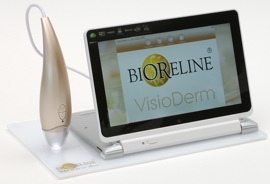 Behind this name, there is a probe whose design evokes a medical thermometer and is endowed with a five million pixel camera to magnify the skin by 50 with three lights.
Behind this name, there is a probe whose design evokes a medical thermometer and is endowed with a five million pixel camera to magnify the skin by 50 with three lights.
•
Visible light
:
this LED-based light shows the skin’s microstructures like striations, wrinkles, and fine lines.
‘We can extrapolate the skin’s condition if it is dry, as well as the condition of its seborrheic secretion,’
Daniel Constant explains.
•
Polarized light
: it reads what is inside the skin. Daniel Constant explains that with
‘a specific filter in the probe, all the sinusoids are oriented towards the same direction. With the reflection on the epidermis, the light keeps being polarized and well-organized. However, the one that penetrates deep in the skin loses this polarization characteristic. To maintain it, we just need to filter both these lights in the camera sensors to discover what is in the dermis, going beyond the epidermis.’
As a result, it is possible to observe any redness or spots starting to develop, but which are not visible on the surface yet,
‘so we can implement a preventive cosmetic action,’
the brand’s President adds.
•
Ultraviolet light
: it plays on fluorescence. Micro-organisms, which can be found in the skin, emit colour when they are stimulated with a UV filter. This way, the pores become visible, and the analysis of their irritation or bacterial inflammation level is accurate.
How does it work?
If the concept is technical, the use is not that complex. The probe just needs to be placed on the face in different areas, depending on the light used. As regards the visible light, Daniel Constant recommends starting with the forehead, temples, and eye corners. Since they are flat, hard surfaces, the reading process is most efficient.
As for the polarized light, the probe goes all over the red parts of the face, while the ultraviolet light focuses on the areas likely to present blocked pores, like the nose wings.
All these elements are then interpreted by PC software devised by the Bioreline team. It carries out a diagnosis of the image by extracting the most significant among the eight parameters studied. The final results are presented in the form of diagrams accessible enough for everyone to understand the data. Daniel Constant’s device goes even farther, since there is a module that targets the beauty protocol best adapted to each skin’s problems. Although Bioreline products are automatically suggested, Daniel Constant smiles, explaining that
‘other cosmetics may be offered: Bioreline does not mean to satisfy everyone.’
Where, when, how?
To be able to get more visible improvement, Bioreline’s President recommends proceeding to a three-month skincare treatment and screening the skin every 30 days, so that the cell renewal process can occur.
Right now, Visioderme is a tool designed for cosmetics professionals, in particular beauty centres. Bioreline lists all the salons fitted with the skin probe on their website.
In terms of price, Daniel Constant invites them to offer the diagnosis for free, but it is up to them to choose.
As personalization is becoming a major current trend, brands vie with each other in ingenuity to delight the general public. We are done with mass consumption (it is rather the era of mass personalization!): every buyer is unique and asserts it.
When will we all be able to carry out our own beauty diagnosis? Daniel Constant concludes saying he
‘cannot reveal anything right now, but the team is working on a connected mobile version to democratize the concept.’
Let us be patient, then…
JS









